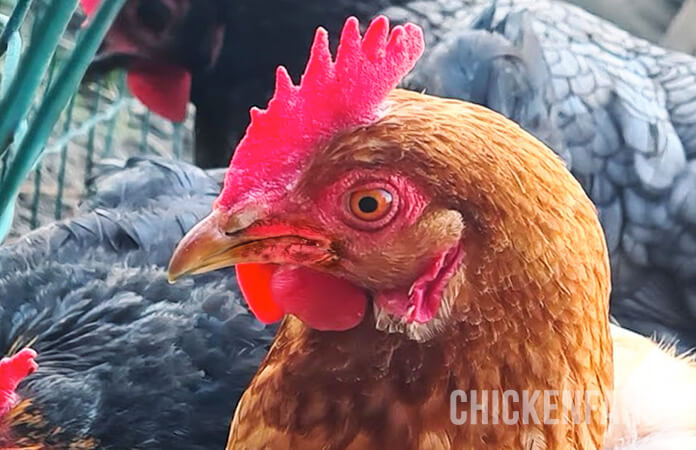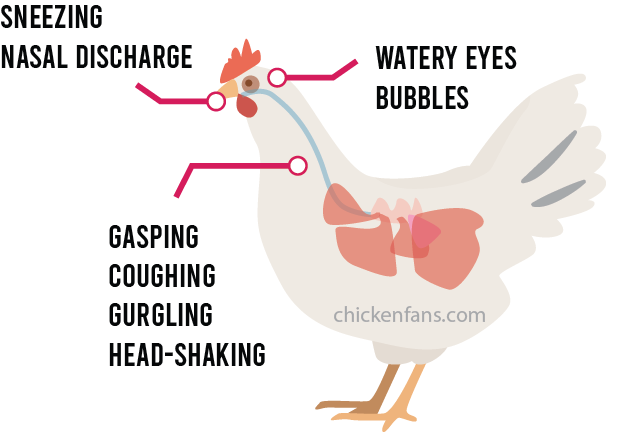7 Reasons your Chicken’s Beak is Bleeding


It can be quite alarming to find your chicken bleeding from the mouth. Should you worry when you find your bird with blood on the beak?
Let’s see.
Why is my chicken’s beak bleeding?
If you find your chicken bleeding from the mouth, it’s either an injury or a disease. Injuries can be self-inflicted or caused by beak-trimming. In the case of a disease, the blood can come from a respiratory infection affecting the lungs, a ruptured blood vessel, a bleeding ulcer, or a heart condition.
Let’s look at the options in detail:
- Beak injury
- Infectious Laryngotracheitis
- Canker
- Wet Fowl Pox
- Ruptured Blood Vessel
- Heart Issues
- Summary
Injury
The most common cause of blood in the mouth or nostrils is trauma. It’s immediately apparent when the beak is broken or damaged. When the chicken doesn’t show any signs of illness, chances are it has hurt itself. They are chickens, after all.
When you are raising backyard chickens, injuries can happen all the time:
- birds pecking on each other’s beaks to establish the pecking order
- aggressive roosters fighting with each other to establish dominance
- being reckless and bumping their beak by running into the infrastructure of the coop
- getting strangled in hardware wire or caught in places they are not supposed to go
- overly active roosters trying to take advantage of a hen
- roosters fighting off predator attacks
- improper placement of pinless peepers on the chicken’s nares
Some beak injuries result from improper beak trimming, which can result in bleeding.
Diagnosis and Treatment
The beak of a chicken is built in multiple layers. The outer shell of the beak is hard keratin, whereas the inner layers are made of soft tissue and bone. Search for cracks and oddities in the beak. The top of the beak should slightly overlap the bottom part.
Minor injuries can heal without intervention, but you should contact a veterinarian when the beak is broken.
If you don’t notice any damage, it’s probably a medical issue when your chicken looks sick and has patches in the mouth, nasal discharge, or any other clinical sign of illness.
Infectious Laryngotracheitis
Infectious laryngotracheitis is a common upper respiratory disease caused by a herpes virus. Chickens that catch the virus will cough, sneeze, and discharge from the nose.
The birds shake their heads and curl their necks in an attempt to clear the airways. This can result in blood in the mucus, often seen on the mouth and feathers. The birds can also suffer from nosebleeds, and you might notice blood-tinged discharge on the nostrils.

Other symptoms of infectious laryngotracheitis include:
- gasping for air with open mouths
- making gurgling sounds
- shaking the head and neck
- watery, foamy eyes
Other respiratory diseases like Infectious Bronchitis and Chronic Respiratory Disease can also damage the lungs and make the birds cough some blood. However, it’s most common with infectious laryngotracheitis.
Diagnosis and Treatment
An infection with infectious laryngotracheitis can be challenging to diagnose as the symptoms look very similar to other respiratory diseases. A veterinarian can make a correct diagnosis.
Unfortunately, there is no way to treat the herpes virus, and you must let the disease run its course.
Canker
Canker is a worldwide infectious disease that is caused by a protozoan parasite. It enters the flock via pigeons and doves.
The disease causes yellowish, cheesy sores in the back of a chicken’s throat and mouth. The sores grow over time, making it difficult to eat, drink, and breathe. Sometimes they can’t even close their beak. Infected birds lose their appetite and drop weight.
When sores get damaged, chickens can start drooling out some blood.
Diagnosis and Treatment
Canker symptoms can look very similar to those you see in the wet form of Fowl Pox. However, the symptoms differ from respiratory diseases, as the birds won’t cough and usually don’t have any nasal discharge.
For mild cases, you can support the bird with garlic extract and apple cider vinegar. Severe cases can be treated with anti-parasitic medication such as metronidazole. Antibiotics can also be used to treat secondary infections.
Wet Fowl Pox
Fowl pox in chickens is a severe infection caused by the avian pox virus. It’s usually transferred by mosquitos. The avian pox virus is not the same as chickenpox in humans.
Fowlpox comes in dry and wet forms. The dry form is well-known as it causes black spots on a chicken’s comb. The wet form occurs when a chicken inhales the virus via dust particles. It creates yellow plaques in the back of the throat. The growing plaques can prevent the bird from eating and drinking.
The plaques damage the inside tissue of the mouth, and an infection can cause bloody mucus.
Diagnosis and Treatment
Chickens infected with wet fowl pox can have difficulty breathing and gasp for air with an open beak. The virus is contagious and can spread via the air or direct contact. It’s important to put the bird in isolation.
Dry pox and wet pox are caused by the same virus and can co-occur. If you had some cases of dry pox in the flock and you noticed some yellowish plaques in the mouth, the chickens might have inhaled some infected dust particles.
There is no specific treatment for fowl pox. As it’s a viral infection, antibiotics won’t help to cure the disease.
Ruptured Blood Vessel
Blood in the mouth can come from a ruptured blood vessel in the mouth or the gullet of a chicken. The inside surface of the mouth and throat is covered with soft tissue covering underlying blood capillaries, a network of tiny blood vessels.
There are several reasons why these vessels might burst. Blisters can appear in the mouth when the blood vessels under the lining of the mouth rupture.
Larger blood vessels in the gullet can have an aneurysm, a bulge in the vessel caused by a weakness in the vessel wall. This weakness can be the cause of high blood pressure or an infection.
Diagnosis and Treatment
If the bleeding is temporary and there are no other signs of illness, chances are it’s just a tiny blood vessel that ruptured. Normally, the body will heal the injury on its own. Ensure the bird has enough vitamin k, essential to help with blood clotting. The optimal values of vitamin K for chickens are much higher than the minimum requirements to prevent deficiencies. Check our vitamin K for chickens guide to see the optimal values for laying hens and meat chickens at any specific age.
Heart Issues
A chicken’s heart has a mitral valve that regulates blood flow. When the valve is narrowed or doesn’t open, it can block the blood flow to the heart’s left chamber. This can lead to increased blood pressure in the blood arteries that supply the lungs, a condition called pulmonary hypertension. It’s a severe condition that can damage the heart and lungs.
Chickens suffering from pulmonary hypertension cough blood coming from their lungs, air sacs, and airways. The blood can show up as small spots in the mucus, but it can also result in plenty of blood in the chicken’s mouth.
Pulmonary hypertension can worsen when chickens are moved too quickly from freezing temperatures to a warm coop. In 2005, more than 400 chicks died of blood in the mouth from a similar situation on a farm housing 11,500 broiler chickens.
Diagnosis and Treatment
It’s almost impossible to detect heart abnormalities in chickens or chicks, let alone cure them. Always handle weak birds with care.
To prevent high blood pressure, manage the ambient temperatures of the chicken coop and avoid switching birds to areas with considerable temperature differences. Ensure your chickens are not suffering from stress and provide them with enough space.
Summary
It can be quite alarming to find your chicken bleeding from the mouth. The culprit is usually some injury. Chickens fight and bump their heads all the time. And sometimes their beak gets bloody due to improper beak trimming.
However, several diseases can cause blood in the beak of a chicken:
- respiratory diseases like infectious laryngotracheitis can cause the bird to cough blood
- canker and fowl pox can grow sores and patches that damage the inside of the mouth and the back of the throat of a chicken
- blood vessels can burst due to several reasons, like an aneurysm, a weak spot in the blood vessel
- underlying heart conditions can cause pulmonary hypertension, pushing blood into the lungs and causing birds to cough blood
Consult a veterinarian whenever a chicken is bleeding from the mouth while showing signs of illness.
If you want to read more about chicken health problems, symptoms, and diseases, check out our ‘Health Page‘. You’ll find a ‘Symptom Checker‘, a complete list of ‘Chicken Behavior‘, and an overlook of the most common ‘Chicken Diseases‘.
Or go to ‘The Classroom‘ and find a comprehensive list of all Chicken Fans articles.

Dr. M. Tanveer is a licensed veterinarian with several years of experience with chickens. He got his degree from the Faculty of Veterinary and Animal Sciences of the Islamia University of Bahawalpur and has firsthand experience as a veterinarian on broiler breeder farms.























